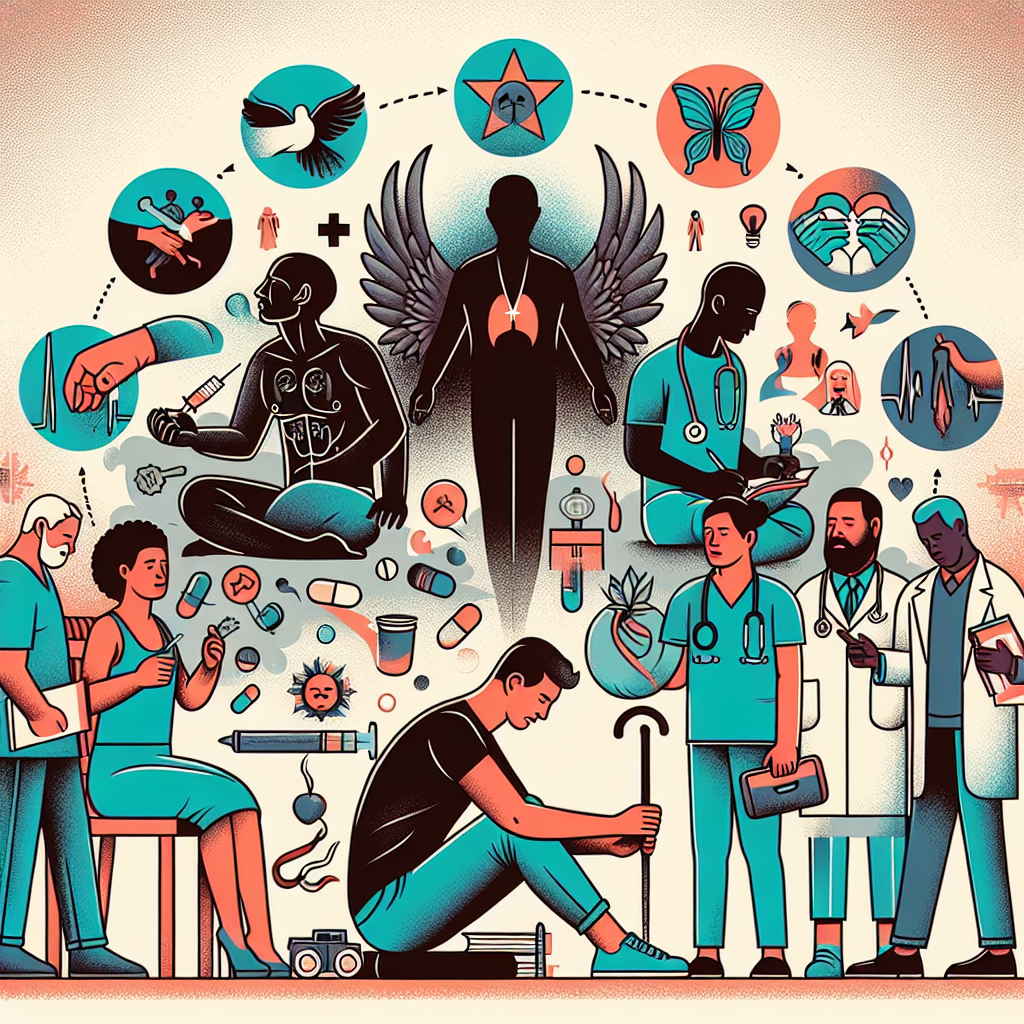-
Table of Contents

“Guiding You to a Brighter Tomorrow: Empowering Early Recovery with Compassion and Care.”
Introduction
Addiction recovery services play a crucial role in supporting individuals in early recovery by providing a structured and supportive environment that addresses the multifaceted challenges of overcoming substance use disorders. These services typically offer a combination of medical, psychological, and social support to help individuals navigate the initial and often most difficult stages of recovery. Medical support may include detoxification and medication-assisted treatment to manage withdrawal symptoms and reduce cravings. Psychological support often involves counseling and therapy to address underlying mental health issues and develop coping strategies. Social support is provided through group therapy, peer support groups, and community resources, which help individuals build a network of understanding and encouragement. By addressing the physical, emotional, and social aspects of addiction, recovery services aim to equip individuals with the tools and resilience needed to achieve and maintain long-term sobriety.
Comprehensive Counseling: The Role of Therapy in Early Addiction Recovery
In the journey of addiction recovery, the early stages are often the most challenging. During this critical period, comprehensive counseling plays a pivotal role in supporting individuals as they navigate the complexities of early recovery. Therapy, in its various forms, provides a foundation upon which individuals can build a new, healthier life. By addressing the underlying issues that contribute to addiction, therapy helps individuals develop the skills and resilience needed to maintain long-term sobriety.
One of the primary ways therapy supports early recovery is by offering a safe and non-judgmental space for individuals to explore their thoughts and emotions. Many people struggling with addiction have experienced trauma, mental health issues, or other significant life challenges. Through individual counseling, they can begin to unpack these experiences and understand how they have influenced their substance use. This process of self-discovery is crucial for healing, as it allows individuals to identify and address the root causes of their addiction.
In addition to individual counseling, group therapy is another essential component of comprehensive counseling in early recovery. Group therapy provides a sense of community and connection, which can be incredibly powerful for individuals who may feel isolated or misunderstood. By sharing their experiences and hearing the stories of others, individuals in recovery can gain new perspectives and insights. This collective support fosters a sense of belonging and reduces feelings of shame and stigma often associated with addiction.
Moreover, therapy equips individuals with practical tools and coping strategies to manage the challenges of early recovery. Cognitive-behavioral therapy (CBT), for example, helps individuals recognize and change negative thought patterns and behaviors that contribute to their addiction. By learning to identify triggers and develop healthier responses, individuals can better navigate the ups and downs of recovery. Similarly, dialectical behavior therapy (DBT) teaches skills such as emotional regulation, distress tolerance, and interpersonal effectiveness, which are invaluable for maintaining sobriety.
Another critical aspect of therapy in early recovery is the focus on building a strong support network. Counselors often work with individuals to identify and strengthen their relationships with family, friends, and other supportive figures. Family therapy can be particularly beneficial, as it addresses the dynamics within the family system that may have contributed to the addiction. By fostering open communication and understanding, family therapy helps rebuild trust and create a more supportive home environment.
Furthermore, therapy encourages individuals to set realistic goals and develop a sense of purpose. In early recovery, it is essential to have a clear vision of what a fulfilling, sober life looks like. Counselors assist individuals in setting short-term and long-term goals, whether related to career, education, or personal growth. This goal-setting process instills a sense of hope and motivation, which are crucial for sustaining recovery.
Lastly, therapy in early recovery emphasizes the importance of self-care and holistic well-being. Addiction often takes a significant toll on an individual’s physical, emotional, and spiritual health. Through counseling, individuals learn the importance of self-care practices such as mindfulness, exercise, and healthy eating. By prioritizing their overall well-being, individuals can build a strong foundation for long-term recovery.
In conclusion, comprehensive counseling plays an indispensable role in supporting individuals in early addiction recovery. Through individual and group therapy, individuals gain insight into the root causes of their addiction, develop practical coping strategies, build a supportive network, set meaningful goals, and prioritize their holistic well-being. This multifaceted approach not only helps individuals navigate the challenges of early recovery but also empowers them to create a fulfilling and sustainable sober life.
Building a Support Network: How Peer Groups Aid Early Recovery
In the journey of addiction recovery, the early stages are often the most challenging. During this critical period, individuals are particularly vulnerable to relapse and may struggle with feelings of isolation, anxiety, and self-doubt. Addiction recovery services play a pivotal role in supporting individuals through these initial hurdles, and one of the most effective tools they offer is the establishment of peer support groups. These groups provide a sense of community, understanding, and shared experience that can be instrumental in fostering long-term recovery.
Peer support groups, such as Alcoholics Anonymous (AA) and Narcotics Anonymous (NA), are built on the principle that individuals who have faced similar struggles can offer unique insights and encouragement to one another. The power of shared experience cannot be overstated; knowing that others have walked the same path and emerged stronger can be incredibly reassuring. This sense of camaraderie helps to break down the walls of isolation that many in early recovery feel, replacing them with a network of understanding and empathy.
Moreover, peer groups offer a structured environment where individuals can share their stories, challenges, and triumphs. This open exchange fosters a sense of accountability and responsibility, as members are encouraged to be honest about their progress and setbacks. The act of verbalizing one’s experiences can be therapeutic in itself, helping individuals to process their emotions and gain new perspectives. Additionally, hearing others’ stories can provide valuable insights and coping strategies that one might not have considered otherwise.
Transitioning from active addiction to recovery often involves significant lifestyle changes, and peer groups can offer practical support in navigating these adjustments. Members can share tips on managing triggers, developing healthy routines, and finding new hobbies or interests that do not involve substance use. This practical advice, grounded in real-life experience, can be more relatable and actionable than theoretical guidance from professionals who may not have lived through addiction themselves.
Furthermore, peer groups often emphasize the importance of setting and achieving small, manageable goals. Celebrating these milestones, no matter how minor they may seem, can build confidence and reinforce the belief that recovery is possible. This positive reinforcement is crucial in early recovery, where self-doubt can be a significant barrier to progress. By witnessing the successes of others and receiving encouragement for their own achievements, individuals can cultivate a more optimistic outlook on their recovery journey.
In addition to emotional and practical support, peer groups can also serve as a bridge to other resources and services. Members often have knowledge of local treatment centers, therapists, and other support services that can be beneficial. This network of information can help individuals access the comprehensive care they need, from medical treatment to mental health support. The collective wisdom of the group can be a valuable resource in navigating the often complex landscape of addiction recovery services.
Ultimately, the sense of belonging and community that peer groups provide can be a lifeline for those in early recovery. The journey to sobriety is rarely a straight path, and having a network of peers who understand the ups and downs can make all the difference. By offering emotional support, practical advice, and a sense of shared purpose, peer groups help individuals build a strong foundation for lasting recovery. In this way, addiction recovery services that incorporate peer support are not just helping individuals stay sober; they are empowering them to reclaim their lives and build a brighter future.
Q&A
1. **Question:** How do addiction recovery services provide emotional support to individuals in early recovery?
**Answer:** Addiction recovery services offer counseling and therapy sessions, both individual and group, to help individuals process their emotions, develop coping strategies, and build a support network.
2. **Question:** What role do addiction recovery services play in helping individuals develop life skills during early recovery?
**Answer:** Addiction recovery services often provide life skills training, such as job readiness programs, financial management workshops, and educational opportunities, to help individuals rebuild their lives and maintain long-term sobriety.
Conclusion
Addiction recovery services support individuals in early recovery by providing structured environments, professional counseling, peer support groups, and educational resources. These services help individuals develop coping strategies, build a support network, and address underlying issues contributing to addiction. By offering a combination of medical, psychological, and social support, these services aim to reduce relapse rates and promote long-term sobriety and overall well-being.



